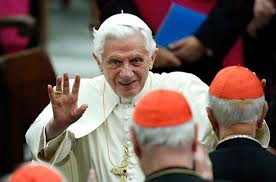The pope’s resignation seems to have surprised almost everyone, everyone that is except the Iranians. In spite of the official Vatican statement that the Pope’s resignation was due to his failing health, Nader Talebzadeh, an Iranian journalist and film director, told an audience at Imam Khomeini International University the real reason for the Pope’s resignation.
“In the past 600 years no pope has ever resigned,” he said. “Therefore a question arises in the public mind as to the reason for it. Of course, the justification provided by the West is that the Pope has grown old.”
Talebzadeh claims that the truth behind the Pope’s surprise announcement is related to a book most of our readers have probably never heard of.
“A gospel named the Gospel of Barnabas, which recognizes the prophet of Islam, which Christianity claims to be fake, is the reason [for the Pope’s resignation]. Throughout history, whenever this gospel was found it was quickly bought and disappeared. It is a gospel in which the name of Islam’s prophet has been mentioned many times.”
Talebzadeh goes on to say that the gospel was found in 2000 by the Turkish police and is being kept there. He is referencing stories that emerged in the Turkish press, and then throughout the Middle East last year, one of which claimed that the Vatican had requested a copy of this book.
These claims are not new. In the last century, there has been significant interest in the Gospel of Barnabas and several claims to have found early copies of this controversial gospel. The book made a stir in the early 1900’s when it was translated first into English and then Arabic. It made headlines in Turkey in the 1980s after a coup carried out by the military to suppress leftist sentiment. Pakistan has run excerpts from the book in its national newspapers for years. Various Muslim scholars have claimed that it is the truest extant copy of the words of Jesus.
Talebzadeh directed a film about the life of Jesus entitled “The Messiah”, which is based on the Gospel of Barnabas. The Gospel of Barnabas reflects many elements of Islamic theology, most notably the claim made by Jesus himself that he was not the Son of God, but that people would pervert his message and make this claim. Another interesting fact is that John the Baptist is replaced everywhere in the Gospel of Barnabas with Jesus, who claims to be preparing the way for Mohammed.
The story behind this enigmatic text is as interesting as the storyline is fantastical.
There are only two extant manuscripts of the Gospel of Barnabas, and only one is complete – the Italian version presently kept in the Austrian National Library; the other is a half-finished Spanish manuscript found in the 1970s in Australia.
The Italian version eventually made its way into the library of Eugene of Savoy, arguably one of the greatest generals of his time. When he died, it was bequeathed with his entire library to the crown.
George Sale mentions the Gospel of Barnabas in the introduction to his English translation of the Qur’an. Sale had in his possession a complete copy of the Spanish version. In fact, the extant Spanish text is likely one that was being copied from Sale’s text when he died at the young age of 39.
In the West, the extant versions seem to have first surfaced in Amsterdam of the early 1700’s, and although the Gospel of Barnabas was discussed by intellectuals, it was eventually forgotten until 1907, when it was translated into English by Lonsdale and Laura Ragg from the Italian version kept in Vienna.
In their introduction, the Raggs pointed out many of the historical inaccuracies and explained why they believed the book was likely a forgery. However, their English version was translated into Arabic, the introduction was omitted, and the rest of the story about how the church suppressed the truth and hid the gospel is history, well, history of the sort one finds in state-run schools, changed and distorted beyond recognition.
Nader Talebzadeh gave no evidence for his assertion that the Gospel of Barnabas was the reason for the Pope’s resignation, but the implication for his audience was clear. The Pope had read the Gospel of Barnabas, understood the truth and could not in good conscience continue to lead a church which had suppressed the truth for so long. In other words, the Pope is somehow principled enough to recognize the truth but not courageous enough to say it.
The rumor that a scandal nicknamed VatiLeaks, involving gay prelates inside the Vatican, may not sell as many copies of his movie, but it is more plausible by far than any claim that the Gospel of Barnabas is behind the Pope’s resignation.
“In the past 600 years no pope has ever resigned,” he said. “Therefore a question arises in the public mind as to the reason for it. Of course, the justification provided by the West is that the Pope has grown old.”
Talebzadeh claims that the truth behind the Pope’s surprise announcement is related to a book most of our readers have probably never heard of.
“A gospel named the Gospel of Barnabas, which recognizes the prophet of Islam, which Christianity claims to be fake, is the reason [for the Pope’s resignation]. Throughout history, whenever this gospel was found it was quickly bought and disappeared. It is a gospel in which the name of Islam’s prophet has been mentioned many times.”
Talebzadeh goes on to say that the gospel was found in 2000 by the Turkish police and is being kept there. He is referencing stories that emerged in the Turkish press, and then throughout the Middle East last year, one of which claimed that the Vatican had requested a copy of this book.
These claims are not new. In the last century, there has been significant interest in the Gospel of Barnabas and several claims to have found early copies of this controversial gospel. The book made a stir in the early 1900’s when it was translated first into English and then Arabic. It made headlines in Turkey in the 1980s after a coup carried out by the military to suppress leftist sentiment. Pakistan has run excerpts from the book in its national newspapers for years. Various Muslim scholars have claimed that it is the truest extant copy of the words of Jesus.
Talebzadeh directed a film about the life of Jesus entitled “The Messiah”, which is based on the Gospel of Barnabas. The Gospel of Barnabas reflects many elements of Islamic theology, most notably the claim made by Jesus himself that he was not the Son of God, but that people would pervert his message and make this claim. Another interesting fact is that John the Baptist is replaced everywhere in the Gospel of Barnabas with Jesus, who claims to be preparing the way for Mohammed.
The story behind this enigmatic text is as interesting as the storyline is fantastical.
There are only two extant manuscripts of the Gospel of Barnabas, and only one is complete – the Italian version presently kept in the Austrian National Library; the other is a half-finished Spanish manuscript found in the 1970s in Australia.
The Italian version eventually made its way into the library of Eugene of Savoy, arguably one of the greatest generals of his time. When he died, it was bequeathed with his entire library to the crown.
George Sale mentions the Gospel of Barnabas in the introduction to his English translation of the Qur’an. Sale had in his possession a complete copy of the Spanish version. In fact, the extant Spanish text is likely one that was being copied from Sale’s text when he died at the young age of 39.
In the West, the extant versions seem to have first surfaced in Amsterdam of the early 1700’s, and although the Gospel of Barnabas was discussed by intellectuals, it was eventually forgotten until 1907, when it was translated into English by Lonsdale and Laura Ragg from the Italian version kept in Vienna.
In their introduction, the Raggs pointed out many of the historical inaccuracies and explained why they believed the book was likely a forgery. However, their English version was translated into Arabic, the introduction was omitted, and the rest of the story about how the church suppressed the truth and hid the gospel is history, well, history of the sort one finds in state-run schools, changed and distorted beyond recognition.
Nader Talebzadeh gave no evidence for his assertion that the Gospel of Barnabas was the reason for the Pope’s resignation, but the implication for his audience was clear. The Pope had read the Gospel of Barnabas, understood the truth and could not in good conscience continue to lead a church which had suppressed the truth for so long. In other words, the Pope is somehow principled enough to recognize the truth but not courageous enough to say it.
The rumor that a scandal nicknamed VatiLeaks, involving gay prelates inside the Vatican, may not sell as many copies of his movie, but it is more plausible by far than any claim that the Gospel of Barnabas is behind the Pope’s resignation.

 RSS Feed
RSS Feed

